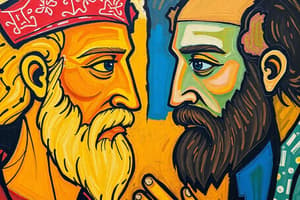Podcast
Questions and Answers
What was the primary focus of philosophy during the modern period?
What was the primary focus of philosophy during the modern period?
- Contemplating God
- Following the Natural law
- Understanding consciousness and rational will (correct)
- Advancement in science and mathematics
During which period was the supreme goal of human beings to contemplate God and follow his will?
During which period was the supreme goal of human beings to contemplate God and follow his will?
- Medieval period (correct)
- Renaissance period
- Modern period
- Ancient period
What is the defining feature of a rational person according to the text?
What is the defining feature of a rational person according to the text?
- Ability to contemplate God
- Making logical conclusions (correct)
- Following the Natural law
- Being influenced by emotions
What was the concentration of philosophy during the medieval period?
What was the concentration of philosophy during the medieval period?
Which period emphasized that truth may be discovered only through the application of reason?
Which period emphasized that truth may be discovered only through the application of reason?
What distinguishes human nature conforming to the Natural law according to the text?
What distinguishes human nature conforming to the Natural law according to the text?
According to Nietzsche, how does he view the purposelessness of life?
According to Nietzsche, how does he view the purposelessness of life?
What did Merleau-Ponty argue is the basis of knowledge?
What did Merleau-Ponty argue is the basis of knowledge?
How did Husserl view the dualistic distinction between 'mind' and 'body'?
How did Husserl view the dualistic distinction between 'mind' and 'body'?
What is Epoche' in phenomenology?
What is Epoche' in phenomenology?
What is Eidetic Reduction according to Husserl?
What is Eidetic Reduction according to Husserl?
'Breathing' to find meaning in purposeless existence, as mentioned in the text, implies:
'Breathing' to find meaning in purposeless existence, as mentioned in the text, implies:
What distinguishes the existentialist view of human existence from the essentialist view?
What distinguishes the existentialist view of human existence from the essentialist view?
How does Aristotle's view on essential substance relate to human existence?
How does Aristotle's view on essential substance relate to human existence?
What is the key characteristic of positive freedom as defined in the text?
What is the key characteristic of positive freedom as defined in the text?
How does existentialism differ from essentialism in terms of finding meaning in life?
How does existentialism differ from essentialism in terms of finding meaning in life?
Which concept is associated with negative freedom according to the text?
Which concept is associated with negative freedom according to the text?
In the context of human freedom, what distinguishes positive freedom from negative freedom?
In the context of human freedom, what distinguishes positive freedom from negative freedom?
Study Notes
Philosophy in Different Periods
- The primary focus of modern philosophy was the application of reason and rational thought to understand the world and existence.
- The medieval period prioritized contemplation of God and adherence to His will, asserting that divine will was central to philosophy.
- Philosophy during the medieval period concentrated on the intersection of faith and reason, heavily influenced by theological perspectives.
Rational thought and human nature
- A rational person is defined by their ability to apply logic and reasoning in understanding life and existence.
- Human nature conforming to Natural Law is distinguished by the capacity to discern moral truths through rational thought.
Perspectives on Existentialism and Knowledge
- Nietzsche posits that life is inherently purposeless, challenging traditional views on meaning and existence.
- Merleau-Ponty argued that knowledge is fundamentally rooted in embodied experience and perception.
- Husserl rejected the rigid dualism of mind and body, advocating for a more integrated understanding of human experience.
Key Concepts in Phenomenology
- Epoche in phenomenology involves the suspension of judgment regarding the existence of the external world to focus on pure experience.
- Eidetic Reduction, according to Husserl, is a method to uncover the essential structures of consciousness by analyzing experiences.
Existentialism vs. Essentialism
- Breathing as a metaphor for finding meaning in purposeless existence suggests an embrace of life, despite the absence of inherent meaning.
- Existentialism differs from essentialism by emphasizing that individuals create their own meaning, rather than adhering to predefined essences.
- Aristotle's view on essential substance relates to human existence through the idea that underlying essences define what a being is.
Concepts of Freedom
- Positive freedom is characterized by self-determination and the realization of one's potential, contrasting with a more passive state.
- Negative freedom, associated with the lack of constraints, highlights the absence of interference in one's choices.
- In the context of human freedom, positive freedom emphasizes active engagement in pursuing personal goals, while negative freedom focuses on the absence of external limitations.
Studying That Suits You
Use AI to generate personalized quizzes and flashcards to suit your learning preferences.
Description
Explore the medieval philosophical perspective on human beings and rationality. Learn about the distinction between animals, plants, and humans in terms of possessing a soul with rational qualities. Delve into the concept of rationality and its significance in medieval philosophy.




